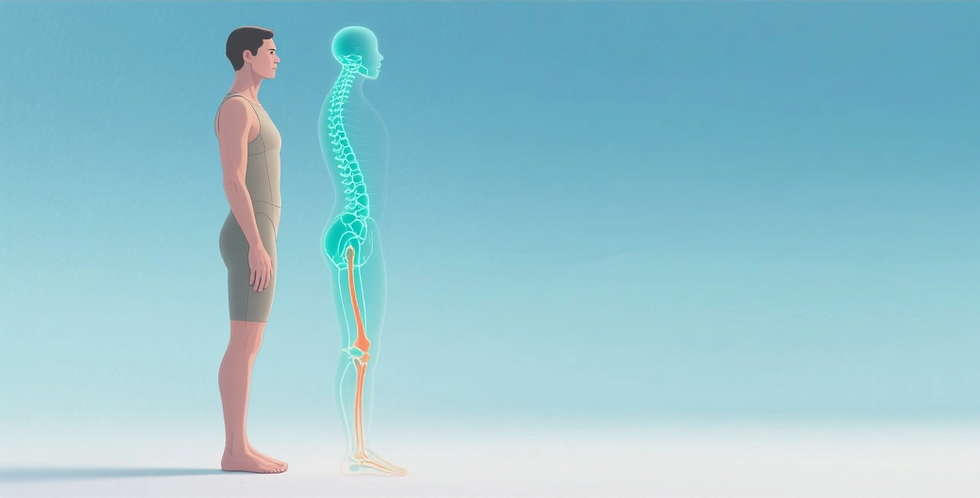Debunking Coffee: The Hidden Truth About Your Daily Cup
- Luc

- Feb 17
- 3 min read
Updated: Feb 18
Is Coffee Really Good for You?
As a self-proclaimed coffee lover, I never thought I’d question my daily cup of cappuccino. For years, I could drink coffee endlessly, savoring its rich aroma and comforting warmth. But over time, I noticed something unsettling: I had become addicted. My reliance on coffee wasn’t just about enjoying the taste anymore—it was a need. This realization led me to switch to alternatives like matcha and guayusa, which offer a gentler energy boost. However, this shift sparked a deeper curiosity: what is coffee really doing to us?
The Science Behind Caffeine and Brain Function
When I started digging into the science and history of coffee, I stumbled upon some fascinating—and alarming—insights. One of the most surprising discoveries was how caffeine affects the brain, particularly the prefrontal cortex. Caffeine doesn’t just wake you up; it alters your brain wave function, pushing it into an alpha brain wave state. While this state is often associated with relaxation and creativity, it also makes the mind more susceptible to external influence.

How Coffee Impacts Your Subconscious Mind
This is where things get even more intriguing. According to Jason Christoff, a health and self-sabotage coach, caffeine can play a role in mind control. He explains that when your brain is in an alpha state, you’re more likely to operate on subconscious programming rather than conscious thought. This means you’re more vulnerable to the repetitive, negative content often found in media and entertainment.
Christoff elaborates:
"They have many modalities of mind control, but they must colonize your mind first before they colonize your body, your wallets, relationships, your beliefs, ideas, and morality. This group has a very simple 1-2 punch: insert negative, repetitive content into all media and government policy in order to cause depression, dysfunction, disempowerment, and disorientation in the collective via the subconscious pathways that naturally mimic repetitive content."
He goes on to suggest that much of this content is designed to increase the use of psychoactive substances, like caffeine, which further deepen the alpha brain wave state. Over time, this can damage the hippocampus, the part of the brain responsible for memory and learning, making individuals even easier to manipulate.
While this perspective may sound extreme, it raises important questions about the role of caffeine and other substances in our daily lives. Are we unknowingly compromising our mental autonomy for the sake of a quick energy boost?
Breaking Free: My Journey from Coffee to Tea
This journey has been eye-opening for me. While I still appreciate the occasional cup of coffee, I’m more mindful of its effects and the broader implications of my choices. Special thanks to Jason Christoff for shedding light on this topic and inspiring me to think critically about something as seemingly innocent as a cup of coffee.
Want to Learn More?
The connection between coffee, brainwaves, and addiction is a fascinating area of research. Studies have shown that caffeine, the primary psychoactive component in coffee, significantly impacts brain activity and functional connectivity. For instance, research using advanced neuroimaging techniques like fMRI and EEG has revealed that coffee consumption can reorganize brain networks, particularly by shifting brainwave activity into states like alpha waves. This state is often associated with relaxation and focus but can also make the brain more susceptible to external influences.
Additionally, habitual coffee drinkers display distinct patterns of brain connectivity compared to non-drinkers. Studies suggest that caffeine alters the default mode network (DMN), a brain region linked to self-referential thought and mind-wandering, by decreasing its connectivity. This shift may enhance focus and alertness but could also suppress creativity and introspection.
Caffeine's addictive potential is another critical aspect. As a central nervous system stimulant, caffeine blocks adenosine receptors, leading to increased dopamine release, which reinforces its consumption. Over time, this can create dependency, with withdrawal symptoms like headaches, fatigue, and irritability when intake is reduced.
Call to Action
If this post resonated with you or sparked curiosity, I invite you to schedule a Healing & Growth Discovery Call. Let’s explore how we can work together to uncover your best self.
For further reading, I highly recommend Jay Dyer’s book Esoteric Hollywood: Sex, Cults, and Symbols in Film. It dives deeper into the themes of media influence and subconscious programming.
Let me know if you'd like me to refine or expand on any of these elements!





Comments